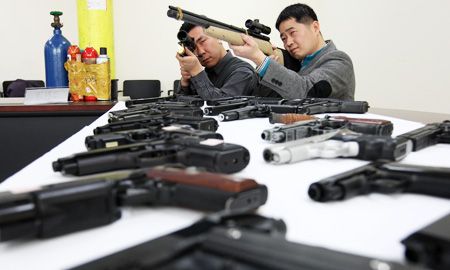US may learn from Korea’s gun control

Officers at the Gyeonggi Provincial Police Agency examines guns it confiscated from illegal sellers on the Internet in this file photo taken in February 2012. The nation enforces strict gun control regulations, but it needs to do more to crack down on illegally traded firearms. / Korea Times
The recent shooting tragedies in the United States and ensuing debates on gun control are shocking and almost incomprehensible to South Koreans because they don’t face such issues pertaining to firearms.
There are strict laws here regarding the possession of hand guns. Citizens can only buy hunting guns and air rifles after obtaining a license from the police. They are only allowed to use guns for a limited period of time, usually during the hunting season.
At other times, the weapons should be kept at police stations, not their houses.
Of course, advertising guns or ammunition is banned, and manufacturing arms, ammunition and their components is permitted only if the maker holds a license.
Do the strict laws mean that people are safe from guns? Not really.
There have been no such incidents as the massacres in Virginia Tech and Sandy Hook Elementary School, but cases of gun violence have been reported continuously.
Most recently, a court sentenced a 58-year-old man charged with fatally shooting a friend with a hunting gun while arguing over money to 20 years in prison in December.
In the military, suicides, homicides and accidents involving firearms have occurred more frequently. However, such cases have rarely been reported to the public. No statistics about casualties from such incidents are publicly available.
In 1993, a 20-year-old Army private deserted with a K1 rifle and 22 grenades. He shot a civilian to death while confronting a police SWAT team in Jongno-gu, central Seoul, before eventually being captured. Six others were also injured by stray bullets.
According to the National Police Agency (NPA), the number of cases in which more than one person was killed by a gun, excluding incidents that occurred in the military, stood at 16 in 2010, compared to 18 in 2006, 12 in 2007, 17 in 2008 and 10 in 2009. The total number of guns owned by civilians here is estimated at some 510,000.
“The country hasn’t yet experienced a gun battle between gangsters or a massacre by a social outcast, but people are exposed to such risks,” an NPA officer said on condition of anonymity. “It’s true that the government’s strict gun control has played a crucial role in restricting gun violence, but what’s more important is people’s conception of guns.”
The official said that most South Korean men learn how to use guns while serving under the mandatory military service, but few resort to using guns to protect themselves or attack other people because they just can’t buy them.
Pyo Chang-won, a former criminology professor at the Korean National Police University says the government should strengthen its gun control further, shifting its focus on cracking down on illegally traded weapons.
“The use of guns by ordinary people can be effectively controlled under the current system. However, people can purchase or produce illegal weapons through various methods,” Pyo said.
“One can buy gun components from foreign websites and assemble them. People can also produce a firearm after downloading related information from the Internet. There is also a possibility that smuggled guns can be used for crimes,” he said.
The NPA has initiated a voluntary reporting system for holders of unregistered firearms, without asking how the weapons were acquired. Each year, it collects thousands of such weapons. <The Korea Times/Na Jeong-ju>























































